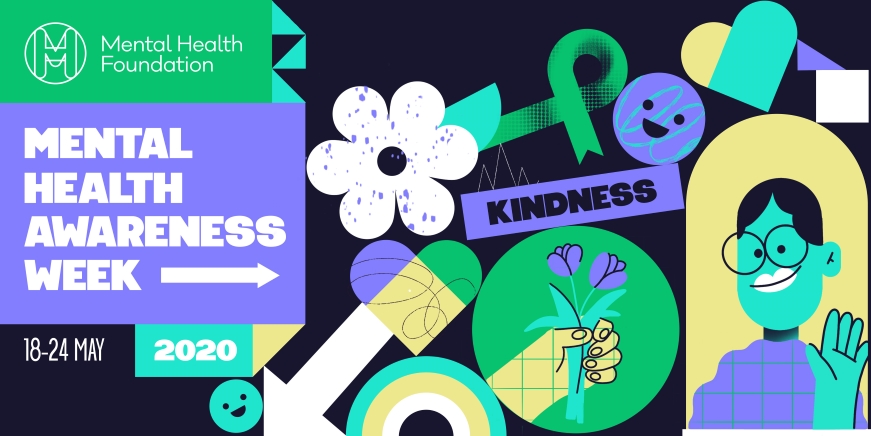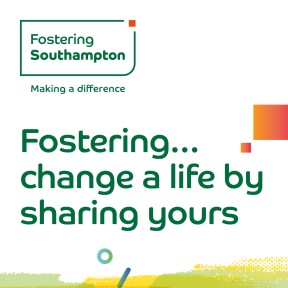Celebrating acts of kindness for Mental Health Awareness Week
A survey of Southampton residents is helping Southampton City Council and partners to understand how the pandemic is impacting upon residents.

Next week's Mental Health Awareness Week (18-22 May), is being used to celebrate acts of kindness across the city that are so important to our mental health. Research shows that being kind to ourselves and others can help improve our emotional wellbeing. It is a vital way in which we can support those who are in mental health need, including those feeling anxious, lonely or with low mood. Kindness brings us together with benefits for everyone.
In Southampton residents have been showing many acts of kindness, from neighbours checking in on each other, workers at our Community Support Hub and of course, NHS and key workers and charity staff responding to those in need and supporting each other.
For more information about kindness and how local champions are showing acts of kindness, see the ‘Time to Change Southampton and Portsmouth’ Facebook page. A survey of Southampton residents (the first undertaken in April) is helping Southampton City Council and partners to understand how the pandemic is impacting upon residents, including on their mental health and emotional wellbeing. While many residents are finding new ways to connect with friends and keep active through exercise, the pandemic is undoubtedly having an impact on emotional wellbeing, and particularly amongst younger age groups and those living alone.
It is hugely important therefore, that we look after ourselves and the people around us. There are lots of things we can do to help us and others stay well in body and mind from home safely, including reaching out to friends and family via Zoom or a telephone call, showing our thanks to key workers through putting a rainbow drawing in our windows, supporting a neighbour that’s shielding or self-isolating, and joining volunteer groups. Southampton Council has set up a Community Support Hub and helpline for people in need of help during the coronavirus pandemic. This includes helping support those that are self isolating or shielding with access to food and medical supplies, and supporting residents where they are social isolated and feeling lonely.
Since the Community Support Hub was set up, its dedicated helpline for residents has taken over 2,300 calls and received over 300 requests for help via its online form. Further information about the Community Support Hub can be found on our Supporting vulnerable people page at or by calling 023 8083 4800.
If you are self-isolating for health or other reasons and need help with daily needs, like food, as well as support, please contact the Southampton Community Hub on 023 8083 4800 (open Monday to Friday, 8.30am to 5pm), contact us via webchat or fill in the online form.
A few findings from the survey:
- A much higher proportion of younger age groups reported feeling anxious than older age groups.
- 12% of respondents did not feel they had someone to support them if they were unable to leave the house to get essentials (this was highest in those in their 30s, those most at risk and those that live alone).
- The most frequently cited reasons for concern and anxiety were:
- concerns for family and friends
- contracting the virus themselves or friends and family
- people not following rules and guidance
- unknown timescales/future
- access to food and supermarket deliveries
- The most frequently cited things that help people cope with anxiety:
- keeping in contact with friends and family
- following official advice
- limiting the amount of news watched or read
- having correct or clear information
- keeping busy and having a routine
The positive impact of the Community Support Hub shines through in colleagues who have been redeployed to help out in the Hub and our dedicated COVID-19 helpline. Colleagues have said:
David Jones said: “It’s been a rewarding experience to have regular chats with residents in isolation who haven’t spoken to another person for days, as well as providing additional support through food parcels or shopping. I’m grateful for the support of my new-found colleagues.”
Iain Shaw adds: “Knowing I’ve played a part to help support families with no food or money and then help make sure that they get the support they need is a great feeling.”
If you are interested in helping out in Southampton, please take a look at our how to help page.
Cllr Dave Shields, Cabinet Member for Healthier and Safer City, said: "As we recover from the initial peak of this pandemic, it's important to recognise the effect that locking ourselves down in our homes may be having on our mental health and wellbeing, to be kind to ourselves and others, and to seek support when we need it. Over the past few weeks, I've seen many acts of kindness between neighbours and even strangers in Southampton. Through such acts, we are pulling together and will emerge stronger from this time."
Dr Debbie Chase, Interim Director of Public Health, Southampton City Council, said: "Where you need our support, our mental health partners in NHS and community organisations are here to help you. Following the 5 Ways to Wellbeing is one important way we can all help ourselves to cope with this new reality: 1) connect with other people; 2) be physically active; 3) learn new skills; 4) give to others; 5) pay attention to the present moment."
Dr Burgess, GP Board member for NHS Southampton City Clinical Commissioning Group, said: “Although health services have been transformed to support patients during COVID-19, they remain open for everyone. If you need medical help or advice, the NHS is here for you at all times so please do seek support if you need it. There are a range of services and support available here in Southampton. We know it can be difficult not seeing family and friends and the coronavirus outbreak is impacting us all differently, so it is really important we take care of our wellbeing."
You can still contact your GP practice for advice or to arrange an appointment either by phone or online. You can self-refer to Steps to Wellbeing online or by phone to access support for mental health problems such as stress, low mood and anxiety as well as COVID-19 emotional wellbeing support advice. Specialist mental health support is also available 24 hours a day, 7 days a week by contacting NHS 111 online or phoning 111 and the Mental Health Triage Service can find the right support for you. If you are under the care of mental health services, you should continue to contact your care team as usual. In life-threatening emergencies, where there is a danger to yours or someone else’s life, always call 999 or visit your nearest Emergency Department.
Find out more about the full range of support available for adults, children and young people, below. We are all here to help you, so please do get in touch and we can find the right way to support you.”
Dr Adam Cox, Psychiatrist and Clinical Director for Southampton for Southern Health NHS Foundation Trust said: “There is strong evidence that being connected with people improves wellbeing, as humans we are biologically wired to be part of a community and we also see that isolation and loneliness worsens peoples depression and anxiety.
We would encourage people to connect with others and nature and make use of the excellent mental health provision in the city, such as the lighthouse and NHS 111.”
If you are struggling with your mental health, remember that it is OK to share your concerns with others you trust - and doing so may help them too. Maintaining healthy relationships with people we trust is important for our mental wellbeing. If you have little social contact with others, social contact can be provided through the Community Support Hub by calling 023 8083 4800.
Where to get support for your mental health and wellbeing:
- For urgent mental health support, you can call NHS111, for the Mental Health Triage Service. If you feel there is an immediate danger to yourself or others, always call 999.
- Solent Mind has a Coronavirus Mental Wellbeing Helpline for anyone who is experiencing poor mental health or wellbeing challenges as a result of the Coronavirus (COVID-19) epidemic: 023 8017 9049, M-F, 10am-4pm.
- If you're experiencing mental or emotional distress, The Lighthouse currently offers an SMS service for those over 18. Text ‘lighthouse’ and your postcode (for example LIGHTHOUSE SO14 0YG) to the Solent Mind text line number (07451276010) between 4.30pm and 12am. One of the team will then contact them via telephone, email, webchat or text. See the Solent Mind website for more info.
- Samaritans has a free to call service 24 hours a day, 365 days a year, if you want to talk to someone in confidence. Call them on 116 123
- Southampton's IAPT service, Steps to Wellbeing continues to accept new referrals and deliver psychological treatments to individuals across the city. All clinical activity is being delivered remotely either online, telephone or video conferencing and they continue to offer individual cognitive behaviour therapy (CBT), counselling, and computerised CBT packages. In response to Covid-19, Steps to Wellbeing have developed a Coping with Covid Anxiety Webinar, which patients can access following self-referral to the service and assessment. Useful resources and videos are also available on the Steps to Wellbeing website. You can self-refer by using the online referral form via the Steps to Wellbeing website or by phone on 023 8027 2000.
- Southern Health NHS Foundation Trust offers a range of advice and services, including help to carers. Their Every Life Matters service is also available, to help prevent suicide and self-harm:
- No Limits offers free independent and confidential advice and support to children and young people in Southampton, whether it’s through their online webchat service, where young people can discussed their worries with a member of the charity’s team, or the new Zoom support sessions:
- SO:Linked is an SCC commissioned service offering community navigation (including mental health). They have adjusted their services in response to Covid and have a set of resources for the community on their website
- For advice on coping with your mental wellbeing during the pandemic and self-assessment, NHS and Public Health England offer Every Mind Matters


